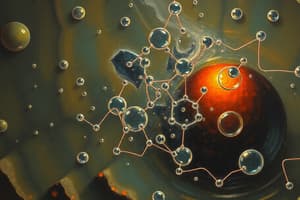Podcast
Questions and Answers
What would be the charge of fluorine that has a full outer shell?
What would be the charge of fluorine that has a full outer shell?
- -1 (correct)
- no charge
- +2
- +1
How many neutrons does a fluorine atom have?
How many neutrons does a fluorine atom have?
- 28
- 9
- 19
- 10 (correct)
How many electrons does a beryllium atom have?
How many electrons does a beryllium atom have?
- 13
- 5
- 9
- 4 (correct)
How many protons does a fluorine atom have?
How many protons does a fluorine atom have?
How many electrons does a fluorine atom have?
How many electrons does a fluorine atom have?
How many electrons does zinc have in its first shell?
How many electrons does zinc have in its first shell?
How many neutrons does neon have?
How many neutrons does neon have?
How many protons does a beryllium atom have?
How many protons does a beryllium atom have?
How many electrons does neon have in its first shell?
How many electrons does neon have in its first shell?
How many neutrons does a beryllium atom have?
How many neutrons does a beryllium atom have?
Flashcards are hidden until you start studying
Study Notes
Fluorine (F)
- Atomic number: 9, indicating 9 protons in its nucleus.
- Approximately atomic mass: 19.
- Charge of a fluorine atom with a full outer shell: -1.
- Neutrons in a fluorine atom: 10 (calculated as atomic mass - atomic number).
- Electrons in a fluorine atom: 9, equal to the number of protons.
Beryllium (Be)
- Atomic number: 4, indicating 4 protons in its nucleus.
- Approximately atomic mass: 9.
- Neutrons in a beryllium atom: 5 (calculated as atomic mass - atomic number).
- Electrons in a beryllium atom: 4, equal to the number of protons.
Zinc (Zn)
- Abbreviation: Zn.
- Electrons in the first shell of zinc: 2.
Neon (Ne)
- Atomic number: 10, indicating 10 protons in its nucleus.
- Approximately atomic mass: 20.
- Neutrons in a neon atom: 10 (calculated as atomic mass - atomic number).
- Electrons in the first shell of neon: 2, but can hold up to 8 electrons.
Studying That Suits You
Use AI to generate personalized quizzes and flashcards to suit your learning preferences.




